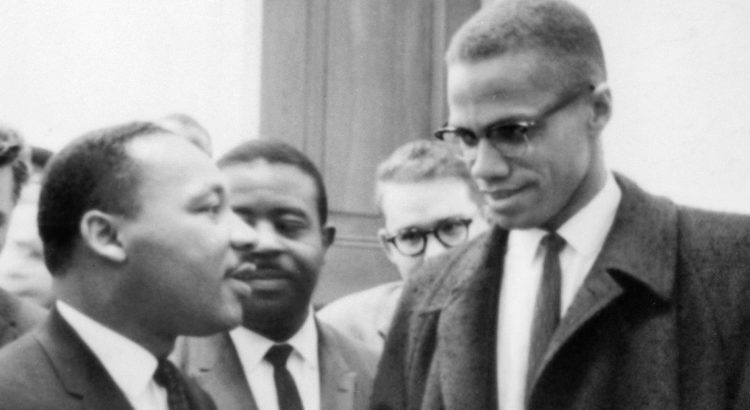(Level B2 and above)
Photo: Martin Luther King Jr (left) and Malcom X.
Written and compiled by Benedicte Gravrand, English trainer at The Language House in Geneva
In North America, February is Black History Month – also known as African American History Month. The rest of the world is not always aware (informé) of this event, but it is a very important one.
Black History Month is a time to honor the contributions and legacy (héritage) of African Americans across history and society.
It is a time to remember activists and civil rights pioneers such as Harriet Tubman and Sojourner Truth, both 19th century American abolitionists and social activists; Marcus Garvey, an early 20th century Jamaican political activist, writer and orator; Martin Luther King Jr., one of the most prominent leaders in the civil rights movement from 1955 until his assassination in 1968; Malcolm X, an American Muslim minister and human rights activist who was a prominent figure during the civil rights movement and also assassinated; and Rosa Parks, best known for her pivotal role in the Montgomery bus boycott, as well as leaders in industry, politics, science, culture and more.
Rosa Parks – icon of black rights in America
This February, it’s complicated
African American history is studied in most schools and universities in the U.S., to varying degrees. But this field of education has encountered some major problems this month, as revisions to the first-ever advanced placement (AP) course in African American history were rejected in Florida.
Florida’s department of education, under the leadership of arch-conservative Republican Governor Ron DeSantis, rejected a new Black studies course for high-achieving high schoolers. The decision has led to a backlash (réaction violente) across the country — from other state lawmakers to labor unions and even a potential lawsuit.
According to the Guardian, Ron DeSantis has intensified white racial fear and resentment by having the Florida department of education very publicly reject the course because they claimed it “significantly lacks educational value”. After the public rejection, the College Board, which develops tests for post-secondary education, got busy very quickly and removed references to topics such as Black Lives Matter and reparations from the curriculum. Black Lives Matter is a political and social movement started in 2013 that seeks to highlight (souligner) racism, discrimination, and racial inequality experienced by black people.
As he was accused of whitewashing history, Gov. Ron DeSantis responded that in Florida students already must learn about the triumphs and plight of African Americans. Indeed, Florida has required its schools to teach African American history since 1994. But nearly three decades later, advocates say many Florida schools are failing to teach that history. Many schools only cover the topic during Black History Month in February, and some districts don’t even realize it’s required instruction.
Ron DeSantis – campaign video from November 2022
Why February?
The origins of the African American History Month can be traced back to Carter G. Woodson, a historian who established the field (domaine) of African American studies in the early 20th century.
In 1915, after attending a three-week celebration of the 50th anniversary of emancipation, Woodson and four others founded the Association for the Study of Negro Life and History (ASNLH) to encourage scholars (intellectuels) to study the Black past. This particular subject was not exactly popular in U.S. schools at the time. The following year, Woodson started editing the association’s publication, The Journal of Negro History. Then Woodson and the ASNLH launched Negro History Week in February 1926.
Two figures important to Black history were born in February: U.S. President Abraham Lincoln, who issued the Emancipation Proclamation in 1863, and Frederick Douglass, who became the leader of the Abolitionist movement. Since the deaths of Lincoln and Douglass (in 1865 and 1895, respectively), the Black community had celebrated their contributions to African American liberation and civil rights on their birthdays. This is why Woodson decided to have the Negro History Week in February. And this event became more widespread (étendu) throughout the U.S. as time went by.
Frederick Douglass
From Week to Month
With the American civil rights movement, a long struggle for Black Americans to gain equal rights, and the rise of Black consciousness, a South African anti-Apartheid activist movement in the 1960s, Negro History Week became Black History Month in more and more places.
Woodson’s association, which had been renamed the Association for the Study of African American Life and History (ASALH), helped in the widespread institutionalization of February as Black History Month.
U.S. President Gerald Ford officially recognized Black History Month in 1976, asking the public to “seize the opportunity to honor the too-often neglected accomplishments of Black Americans in every area of endeavor throughout our history.”
In 1995, Canada‘s House of Commons officially recognized February as Black History Month.
In the United Kingdom, Black History Month was first celebrated in October 1987, a year which coincided with the 150th anniversary of Caribbean emancipation, the centenary of the birth of Marcus Garvey, a Jamaican political activist, and the 25th anniversary of the Organization of African Unity, an intergovernmental organization that aimed to encourage political and economic integration among African states and to eradicate colonialism, which was replaced by the African Union (AU) in 2002.
“Black History Month Ireland” was initiated in Cork in 2010. Cork was the center of abolition in the 19th century, and the anti-slavery societies welcomed several black abolitionists to lecture there, including Charles Lenox Remond, a 19th century American orator and activist, and Frederick Douglass.
Let us remember the great men and women who had a dream and fought for it.


